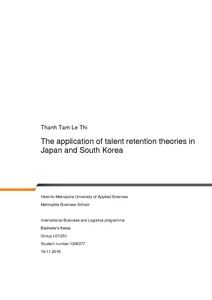The application of talent retention theories in Japan and South Korea
Le, Tam (2016)
Le, Tam
Metropolia Ammattikorkeakoulu
2016
All rights reserved
Julkaisun pysyvä osoite on
https://urn.fi/URN:NBN:fi:amk-2016122421480
https://urn.fi/URN:NBN:fi:amk-2016122421480
Tiivistelmä
This report is a study of talent management theory – a new approach to HRM to retain and maximize employees’ potentials, relating practices and to what extend it is applied in Japan and South Korea. To better explain why the implementation of talent retention theory may vary from Western countries or the US, a brief look into East (Confucian) Asian culture was taken, as culture plays a decisive role in human behavior and partly determines the archetypical retention requirements of different characteristic groups. Both Japan and Korea portrait traits of a Confucian culture: the emphasis on education background (which can even dictate one’s social status) and the practice of rote learning, work ethic that glorifies diligence and over efficiency, various and sturdy social hierarchies, and interpersonal relationships at workplace that are more than just professional. While experiencing different historical paths and possessing distinguish cultural features, the region is not completely foreign to a management approach that focuses on employee relations and talent. Japan is well-known for its management style that includes lifetime employment, seniority wage system, etc. and concepts that are based on or similar to Western theories that are incorporate in modern popular textbooks. Its people’s willingness to sacrifice for communal progress during hard times and the highly egalitarian, the culture of diligence and resistance to change are also what hindering the country from globalizing its working environment. Meanwhile, the rest of the region has been less, if not at all, known for management success, but is reaching fast for a more modernized approach to talent management, i.e. Korea has a more standardized recruitment process. Both countries in concern are reported to exercise excessively long working hours that lead to several social problems, even casualty; their students’ academic performance are top-knot, however the practicality level of such education is questionable when fresh graduates still require on-the-job training. As the situation is for the whole region, there is growing, but still deficient recognition for the importance of talent planning and talent management; several other issues are also widely coined by the public but receive neither acknowledgement nor satisfactory solution. Employing a totally universalist approach to management talents in Japan and Korea would not be effective. Instead, a locally customized retention package (even better if tailored to individual needs) that promote fair working environment, career progress and gender wise, and work-life balance, combined with special policies to tackle social issues relating to workplace would be advised.
